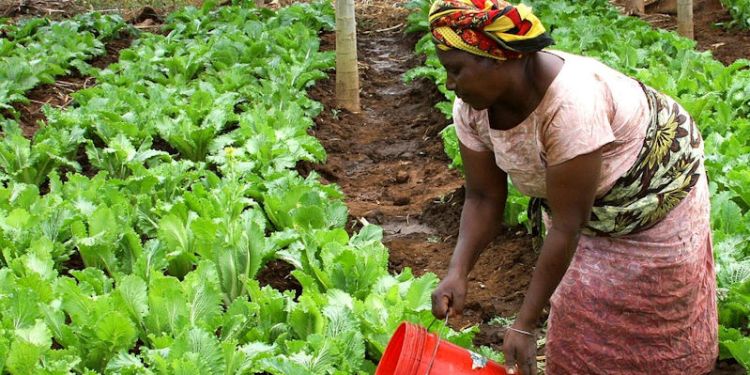Empowering African farmers for a more sustainable future

Small-scale farmers in Ghana and Tanzania will have greater visibility and a strong voice in national food systems debates through research led by Professor Anne Tallontire from the School of Earth and Environment. The project will also train a new generation of African researchers to develop a more sustainable future for local farming communities.
Voices, needs, and concerns among African producers are rarely heard by national decision-makers, but food systems depend on their produce. The farmers are rarely consulted about food markets and the how food gets from producer to consumer, or about their needs to support production and trade. At an international level, the voice of the small producer is virtually non-existent, with markets dominated by large multinationals in food trade, processing manufacture and more recently retail. Often, the farmers struggle to feed themselves and their families, and end up producing food to meet the demands of far-off markets.
A network of early career researchers from African partner Universities, Non-Governmental Organisations (NGOs), and small-scale producers have been brought together in Ghana and Tanzania as part of Professor Tallontire’s research to tackle these problems.
“By shifting the national debate on food and agriculture, we are giving a strong voice to the small-scale producers within the supply chain’s governance and including that voice in the policy process from an early stage,” said Professor Tallontire.
Her team works closely with the network to address these challenges faced by farmers and incorporate their feedback into the national and international debates and planning about food production and consumption. A key part of the project is strengthening the research culture within the network. The aim is to shift the conversation about food systems on a national level to consider national and local level food needs.
We are giving a strong voice to the small-scale producers within the supply chain’s governance and including that voice in the policy process from an early stage.
The research is the result of an Arts and Humanities Research Council (AHRC)-Global Challenges Research Fund (GCRF) large partnership award. It is part of a wider GCRF Collective Programme, which aims to enhance impact across the six strategic challenge portfolios, including ‘food systems.’
The project involves 10 partners across the network, which includes Ghanaian and Tanzanian partner Universities and national farmers’ organisations.
Systems of provision
Labour-intensive farming, low prices for food crops, and challenging pest control makes it difficult for African farmers to fund and manage their crop cycles. Finance for small farms is hard to obtain, and many international interventions, including packages of seeds, fertilisers and pesticides, are either not accessible or unsuitable for the farmers’ needs.
Uniquely, Professor Tallontire’s team takes a holistic approach to these issues by building up capacity of farmers’ organisations to tackle their root causes.
The research has the potential to give small producers’ organisations better understanding of the and perspectives of and problems faced by their members and aims to drive long-term change by enabling them to articulate bottom-up solutions in national debates.
“Being critical of the food system requires a bringing together insights from different disciplinary perspectives and the ability to tackle issues from a variety of angles,”explained Professor Tallontire. “We aim to build up the capacity of early career researchers to do the kinds of applied research that farmer organisations are looking for.”
She continued: “We will work with Tanzanian and Ghanaian academics to deliver training sessions and jointly supervise pilot projects designed together with the farmer organisations. Working together will enable us to learn from this experience and develop advocacy strategies using learning from the pilot projects.”
Working together with Tanzanian and Ghanaian academics will enable us to learn from this experience and develop advocacy strategies using learning from the pilot projects.
Building partnerships
The research follows previous research where Professor Tallontire and colleagues first engaged with networks in Ghana and Tanzania. The aim was to work with the producers organisations and strengthen links between the countries.
In-country workshops were hosted by Leeds researchers to enable local farmers and NGOs to communicate their needs, giving greater insight into how the collaboration could work. The project’s success led to Professor Tallontire’s current work with the small producers groups.
“Building an equitable research partnership is the AHRC-GCRF project’s foundation. We forged networks that will not only strengthen the research culture to support the producers, but also nurture the next generation of Ghanaian and Tanzanian food and farming scholars through the project’s training programme,” said Professor Tallontire.
By working with closely with the producers, the researchers will understand their challenges on an individual level and gain greater insight into possible ways to combat them. Ultimately, these networks will bring equity into these small farming communities and cultivate a culture of learning and development.
We forged networks that will strengthen the research culture to support the producers and nurture the next generation of Ghanaian and Tanzanian food and farming scholars.
Interdisciplinary research
A member of the Fair Trade International Symposium (FTIS) Steering Group, Professor Tallontire actively champions sustainable food systems, and has helped Fairtrade International to develop their engagement policy.
She carries out part of her research at the University’s interdisciplinary Global Food and Environment Institute (GFEI), where researchers work with the University’s partners worldwide to investigate and improve agri-food supply chains.
The Sustainable Food Systems MSc was born out of research outputs generated by Professor Tallontire and colleagues. The interdisciplinary degree is pioneered by experts from a range of backgrounds, including psychologists, sociologists, data analysts and sustainable business.
Contact us
If you would like to discuss this research in more detail, please contact Professor Anne Tallontire.

